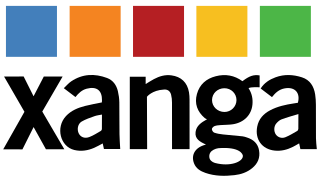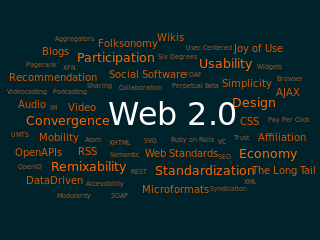
Dave Winer is an American software developer, entrepreneur, and writer who resides in New York City. Winer is noted for his contributions to outliners, scripting, content management, and web services, as well as blogging and podcasting. He is the founder of the software companies Living Videotext, Userland Software and Small Picture Inc., a former contributing editor for the Web magazine HotWired, the author of the Scripting News weblog, a former research fellow at Harvard Law School, and current visiting scholar at New York University's Arthur L. Carter Journalism Institute.

UserLand Software is a US-based software company, founded in 1988, that sells web content management, as well as blogging software packages and services.

RSS is a web feed that allows users and applications to access updates to websites in a standardized, computer-readable format. Subscribing to RSS feeds can allow a user to keep track of many different websites in a single news aggregator, which constantly monitor sites for new content, removing the need for the user to manually check them. News aggregators can be built into a browser, installed on a desktop computer, or installed on a mobile device.

Movable Type is a weblog publishing system developed by the company Six Apart. It was publicly announced on September 3, 2001; version 1.0 was publicly released on October 8, 2001. The current version is 7.0.

The name Atom applies to a pair of related Web standards. The Atom Syndication Format is an XML language used for web feeds, while the Atom Publishing Protocol is a simple HTTP-based protocol for creating and updating web resources.

Xanga was a website that hosted weblogs, photoblogs, and social networking profiles. It was operated by Xanga.com, Inc. and based in New York City.

On the World Wide Web, a web feed is a data format used for providing users with frequently updated content. Content distributors syndicate a web feed, thereby allowing users to subscribe a channel to it by adding the feed resource address to a news aggregator client. Users typically subscribe to a feed by manually entering the URL of a feed or clicking a link in a web browser or by dragging the link from the web browser to the aggregator, thus "RSS and Atom files provide news updates from a website in a simple form for your computer."

Meg Hourihan is the cofounder of Pyra Labs, the company that launched the Blogger personal blogging software that was acquired by Google.
Broadcatching is the downloading of digital content that has been made available over the Internet using RSS.

Web 2.0 refers to websites that emphasize user-generated content, ease of use, participatory culture and interoperability for end users.

Blosxom is a free-software weblog program written in Perl by Rael Dornfest. It uses the pre-existing file system instead of a database management system, unlike most blog software.

In computing, a news aggregator, also termed a feed aggregator, feed reader, news reader, RSS reader, or simply an aggregator is client software or a web application that aggregates syndicated web content such as online newspapers, blogs, podcasts, and video blogs (vlogs) in one location for easy viewing. The updates distributed may include journal tables of contents, podcasts, videos, and news items.
In blogging, a ping is an XML-RPC-based push mechanism by which a weblog notifies a server that its content has been updated. An XML-RPC signal is sent from the weblog to one or more Ping servers, as specified by originating weblog), to notify a list of their "Services" of new content on the weblog.
This is a list of blogging terms. Blogging, like any hobby, has developed something of a specialized vocabulary. The following is an attempt to explain a few of the more common phrases and words, including etymologies when not obvious.
Podcasts, previously known as "audioblogs", had its roots dating back to the 1980s. With the advent of broadband Internet access and portable digital audio playback devices such as the iPod, podcasting began to catch hold in late 2004. Today there are more than 115,000 English-language podcasts available on the Internet, and dozens of websites available for distribution at little or no cost to the producer or listener.
Traction TeamPage is a proprietary enterprise 2.0 social software product developed by Traction Software Inc. of Providence, Rhode Island.
Web syndication technologies were preceded by metadata standards such as the Meta Content Framework (MCF) and the Resource Description Framework (RDF), as well as by 'push' specifications such as Channel Definition Format (CDF). Early web syndication standards included Information and Content Exchange (ICE) and RSS. More recent specifications include Atom and GData.
While the term "blog" was not coined until the late 1990s, the history of blogging starts with several digital precursors to it. Before "blogging" became popular, digital communities took many forms, including Usenet, commercial online services such as GEnie, BiX and the early CompuServe, e-mail lists and Bulletin Board Systems (BBS). In the 1990s, Internet forum software, such as WebEx, created running conversations with "threads". Threads are topical connections between messages on a metaphorical "corkboard". Some have likened blogging to the Mass-Observation project of the mid-20th century.

Geeklog is open-source software that works as a Weblog, CMS or Web Portal." It is written in PHP and during its history has supported MySQL, PostgreSQL, or Microsoft SQL Server as a database backend.
Greymatter is a free and open-source blogging software package, originally created by Noah Grey in November 2000. It was "the original opensource weblogging software". Noah Grey stopped maintaining it around 2002. Since then, it has been maintained by the community of users. It is one of the first software packages created for blogging, and had a large number of users. With the creation of WordPress and Google's Blogspot, its users have declined since 2005, but it is still in use.









